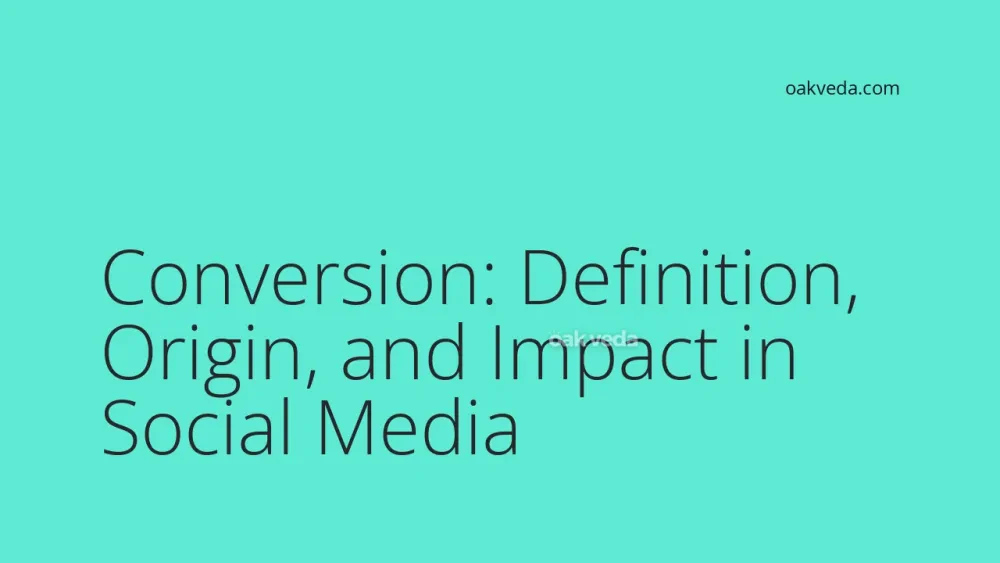
What is Conversion in Social Media?
Conversion in social media refers to the process of transforming a passive follower or user into an active participant in a brand's marketing or sales funnel. This transformation typically involves encouraging users to take specific actions, such as making a purchase, signing up for a newsletter, or filling out a form. The ultimate goal of conversion is to drive measurable business results through social media platforms.
Origin and Development of Social Media Conversion
The concept of conversion has its roots in traditional marketing but has evolved significantly with the rise of social media. As businesses began to recognize the potential of social platforms for reaching and engaging customers, the focus shifted from merely building a following to leveraging that audience for tangible business outcomes.
How Social Media Conversion Works
Conversion in social media is a multi-step process that involves:
- Building a strong following: Creating engaging content, using hashtags, and promoting profiles across various platforms.
- Establishing trust: Consistently providing valuable and relevant content to followers.
- Driving traffic: Encouraging users to visit the brand's website or landing pages.
- Encouraging action: Using compelling calls-to-action (CTAs) to prompt desired behaviors.
- Measuring results: Tracking and analyzing performance metrics to optimize strategies.
Types of Social Media Conversions
Conversions can take various forms, depending on a brand's goals:
- Sales conversions: Direct purchases resulting from social media interactions.
- Lead generation: Collecting user information for future marketing efforts.
- Content engagement: Encouraging shares, comments, or likes on posts.
- App installations: Prompting users to download and install mobile applications.
- Event registrations: Driving sign-ups for webinars, workshops, or in-person events.
Popular Examples of Successful Social Media Conversions
- Airbnb's Instagram Stories: Using swipe-up links to drive bookings directly from engaging visual content.
- Glossier's user-generated content: Leveraging customer photos and reviews to inspire purchases.
- Spotify's personalized year-end wrap-ups: Encouraging users to share their listening habits, driving app engagement and new user sign-ups.
Impact of Conversion on Social Media Culture
The focus on conversion has significantly influenced social media culture:
- Content quality: Brands now prioritize creating valuable, conversion-oriented content.
- User expectations: Followers anticipate clear value propositions from the brands they engage with.
- Platform features: Social networks have introduced shopping and lead generation tools to facilitate conversions.
- Influencer marketing: Collaborations now often include specific conversion goals and metrics.
How Brands and Influencers Use Conversion Strategies
Brands and influencers employ various tactics to drive conversions:
- Targeted advertising: Using platform-specific tools to reach users most likely to convert.
- Limited-time offers: Creating a sense of urgency to prompt immediate action.
- Exclusive content: Offering valuable resources in exchange for user information or actions.
- Social proof: Showcasing testimonials and user-generated content to build trust.
- Retargeting: Re-engaging users who have shown interest but haven't converted.
Measuring Social Media Conversion Success
To gauge the effectiveness of conversion efforts, marketers use several key metrics:
- Click-through rate (CTR): Measures the percentage of users who click on a specific link.
- Conversion rate: Calculates the percentage of users who complete a desired action.
- Cost per conversion: Determines the financial efficiency of conversion strategies.
- Return on ad spend (ROAS): Evaluates the revenue generated relative to advertising costs.
- Engagement rate: Assesses the level of interaction with social media content.
Future Trends in Social Media Conversion
As social media continues to evolve, several trends are shaping the future of conversion:
- AI-powered personalization: Tailoring content and offers to individual user preferences.
- Social commerce: Seamless in-platform shopping experiences.
- Video-centric strategies: Leveraging short-form and live video content for conversions.
- Voice and visual search optimization: Adapting to new search behaviors.
- Privacy-first approaches: Developing conversion strategies that respect user data concerns.
FAQs about Social Media Conversion
What's the difference between a conversion and an engagement?
While engagements (likes, comments, shares) indicate interest, conversions involve users taking specific actions that directly contribute to business goals.
How can I improve my social media conversion rate?
Focus on creating valuable content, use clear CTAs, optimize your landing pages, and continuously test and refine your strategies based on performance data.
Are all social media platforms equally effective for conversions?
No, the effectiveness varies depending on your target audience and product/service. Research where your audience is most active and tailor your approach accordingly.
How often should I post conversion-oriented content?
Balance promotional content with value-adding posts. A general rule is the 80/20 principle: 80% informative content, 20% conversion-focused.
Can influencers help with conversions?
Yes, influencers can be effective in driving conversions, especially when their audience aligns closely with your target market and the partnership feels authentic.
In conclusion, mastering social media conversion is crucial for businesses looking to transform their online presence into tangible results. By understanding the mechanics of conversion, implementing effective strategies, and staying abreast of emerging trends, brands can successfully navigate the ever-changing landscape of social media marketing and drive meaningful business growth.
You may be interested in:
- Krissed: Definition, Origin, and Impact on Social Media
- Brand Style Guide: Definition, Origin, and Impact
- Mega-Influencer: Definition, Origin, and Impact on Social Media
- Era: Definition, Origin, and Impact on Social Media Culture
- Trigger Warning: Definition, Origin, and Impact on Social Media
- OpenAI: Definition, Origin, and Impact on Social Media

